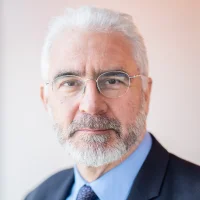Simon Glendinning

To celebrate the 30 years anniversary of the European Institute, we launched the #MyEI Questionnaire series, where we asked members of our community to reflect on their favourite memories in the department.

In this edition, Professor Simon Glendinning, Head of the European Institute and Professor in European Philosophy, tells us about his time at the EI since joining as a Fellow in 2003.
How long have you been at LSE and how did you come to join the European Institute?
I first came to LSE in 2003/4. It was a three-year position as Fellow in European Philosophy in the European Institute. It was a bit of a risk taking the job: I had a full-time position already in the Philosophy Department at the University of Reading. But it wasn’t that risky: I took the LSE job as a sort of "secondment", and the expectation was that I would go back to Reading after three years of fun in London. Once I arrived, however, I quickly realised that I really did not want to leave…
How has the European Institute changed during your time here?
In the most important respect, it has changed very little: it is an exceptionally collegial environment to work in. That is a more or less continuous internal reality. There have been a few occasions in the past when that internal reality has had to contend with external pressures. But we are in much calmer waters now, and look ahead to a continuously brightening future.
What gives me the greatest satisfaction is the transformation of my teaching activity while I have been here – from offering courses in European Philosophy to courses in Philosophy of Europe.
What has been the most memorable moment during your time at the EI?
I have two personal memories that stand out: first, getting a full-time job in the EI after the three years as a Fellow; and, second, getting promoted to Professor. But among many happy memories of the EI as a department, I think the one I will remember most fondly was the promotion to Professor of two female colleagues, Esra Ozyurek and Waltraud Schelkle. That was a very good day for them and for the EI, and as Head of the Institute I felt very proud, and, indeed, moved – somewhat to my surprise, more moved than they were. They took it in their stride. I shed a tear.
What course or subject area have you enjoyed teaching the most?
I have enjoyed all of my teaching in the EI. However, what gives me the greatest satisfaction is the transformation of my teaching activity while I have been here – from offering courses in European Philosophy to courses in Philosophy of Europe. I would not say that I invented the latter, there were some efforts at it already underway – but what I have made of it I have tried to do in my own way, and this process all began with forcing myself to teach it (whatever "it" is). Those courses were the real foundation of my two-volume book Europe: A Philosophical History, which finally came out this year, and is probably the academic achievement I am most proud of.
What makes the EI a special place?
The people who have been in it, and the work they do.
What excites you about the future of the EI?
The people who will be in it, and the work they do.
What’s your favourite place on LSE campus?
I loved my old office in Cowdray House. It was quirky, old, and quite grand. (My new office in the Centre Building is nice, but it is a bit of a box – more of a functional unit than a room.) I think being at an event with a full house in the Old Theatre is still one of the most magical experiences one can have at LSE.
What is your favourite place to visit in Europe and why?
West Cork, Ireland. It’s a little bit of heaven by the water.